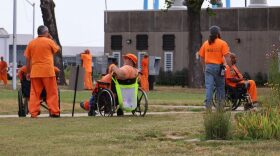Resignations of two members of the Oklahoma Pardon and Parole Board have delayed a death-row inmate’s clemency hearing to 10 days before he is set to be executed.
Kevin Underwood was originally scheduled on Wednesday to plead for clemency before his execution date Dec. 19, but two departures from the board threatened to postpone the hearing indefinitely. Under pressure from the Attorney General’s Office to avoid delay, the board has reset the clemency hearing to Dec. 9.
The resignations of Pardon and Parole Board Chairman Calvin Prince III and member Edward Konieczny initially prompted the board on Friday to cancel its December meetings, which were meant to take place Monday through Wednesday. All votes on the board’s December docket besides Underwood’s clemency hearing are still postponed.
Neither Prince nor Konieczny cited a reason for resigning, according to their resignation letters, which Oklahoma Voice obtained.
After the board canceled Underwood’s clemency hearing, Attorney General Gentner Drummond filed an emergency petition on Monday with the Oklahoma Court of Criminal Appeals, asking that the proceeding continue as originally planned despite the resignations. Hours later, the board agreed to reset the hearing date.
Underwood, 44, was convicted of the 2006 murder of 10-year-old Jamie Rose Bolin.
“Jamie’s family has already waited 18 agonizing years to see justice served,” Drummond said in a statement. “Adding further delay is needless and unconscionable. Kevin Underwood is a deeply evil monster whose execution absolutely should be carried out without further setback. I urge Gov. (Kevin) Stitt to ensure justice is served at last in this hideous case.”
The five-seat board still has the minimum number of members needed to meet. However, the board prefers to have all five positions filled when considering the clemency request, said Tom Bates, the board’s executive director.
Originally, the board planned to wait for the governor to appoint replacements for the two departed members, but Drummond urged against the indefinite delay. The Governor’s Office did not immediately return a request for comment Monday on its timeline to fill the open positions.
Unless Stitt chooses replacements this week, the board would have to carry out the Dec. 9 clemency hearing with its remaining three members.
Death-row inmates are permitted to request a clemency hearing with the Pardon and Parole Board. If the board agrees to recommend clemency, the governor then makes the final decision on whether to commute a death sentence to a less severe punishment and whether that inmate would ever be eligible for parole after commutation.
Stitt has commuted only one death sentence — Julius Jones’ in 2021. The governor granted him life in prison without parole after significant public outcry against Jones’ execution.
Underwood has not received any similar widespread advocacy to his defense. He committed “one of the most depraved and gruesome crimes in Oklahoma history,” the Attorney General’s Office said.
Underwood was convicted of killing and trying to decapitate Bolin. He planned to abduct, kill, rape and eat her, according to public documents.
His attorneys contend Underwood suffered from abuse at home, bullying at school, mental illness and a pornography addiction, according to paperwork they filed for the clemency hearing.
The Pardon and Parole Board’s canceled meetings also postpone consideration of hundreds of parole requests. Bates said the board will take those up in January.
Prince and Konieczny each had two years left in their terms when they resigned. Konieczny, whom Stitt appointed in January 2022 and reappointed in January 2023, vacated his position at the end of the board’s previous meeting Nov. 6, according to his Oct. 28 resignation letter.
Prince, who was appointed in January 2023, informed the board through his attorney Friday afternoon that he resigned immediately.
The Pardon and Parole Board has voted on clemency while short-handed before. It did so last year when a member abstained from voting on Richard Glossip’s capital murder case. Glossip’s clemency request failed when the board voted 2-2. A clemency recommendation must have support from at least a three-member majority of the board.
Glossip later filed an appeal in Oklahoma County District Court, contending his execution should be blocked because all five members of the board did not take part in his clemency hearing. That appeal is indefinitely postponed while the U.S. Supreme Court considers whether to overturn Glossip’s conviction.
Oklahoma Voice is part of States Newsroom, a nonprofit news network supported by grants and a coalition of donors as a 501c(3) public charity. Oklahoma Voice maintains editorial independence.








